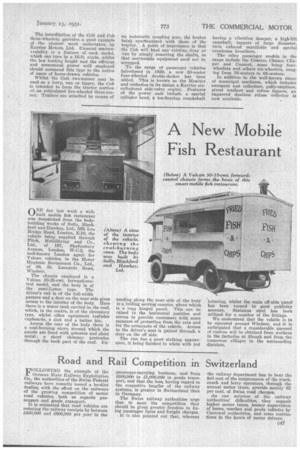A New Mobile Fish Restaurant
Page 69

If you've noticed an error in this article please click here to report it so we can fix it.
ONE day last week a well, built mobile fish restaurant was despatched from the bodybuilding works of Sully, Blackford and Hawkey, Ltd., 588, Lea Bridge Road, London, E.10, the vehicle being supplied through Fitch, McGillivray and Co., Ltd., of 167, Shaftesbury Avenue, London, W.C.2, the well-known London agent for Vulcan vehicles, to the Motor Hygienic Restaurant Co., Ltd., of 59, St. Leonards Road, Windsor.
The chassis employed is a Vulcan 30-35-cwt. forward-control model, and the body is of the semi-Luton type. The driver's cab is of the full-width pattern and a door on the near side gives access to the interior of the body. Here there is a water tank carried in the roof, which, in the centre, is of the clerestory type, whilst other equipment includes cupboards, a sink and a batter bin.
Across the rear of the body there is a coal-burning stove, around which the panels are lined with asbestos and sheet metal ; a short chimney protrudes through the back part of the roof. Ex
tending along the near aide of the body is a folding serving counter, above which is a long hinged panel. This can be raised to the horizontal position and serves to provide customers with some measure of protection from the rain and for the occupants of the vehicle. Access to the driver's seat is gained through a door on the off side.
The van has a most striking appearance, it being finished in white with red lettering, whilst the main off-side panel has been turned to good publicity account. Stainless steel has been utilized for a number of the fittings.
We understand that the vehicle is to be operated around Windsor, and it is anticipated that a considerable amount of custom will be obtained from workers in the factories at Slough and from the numerous villages in the surrounding districts.












































































































